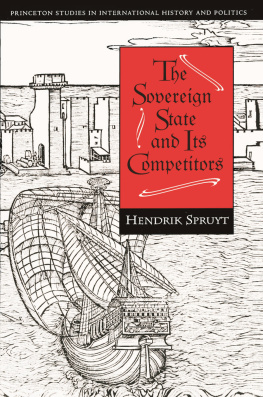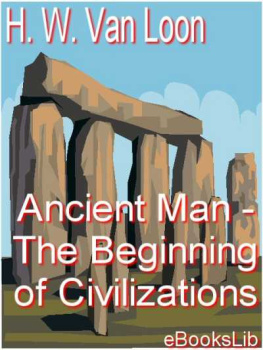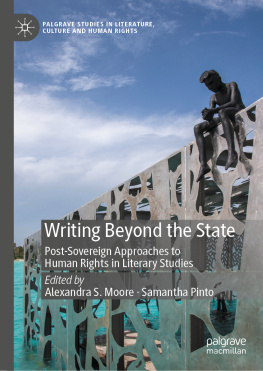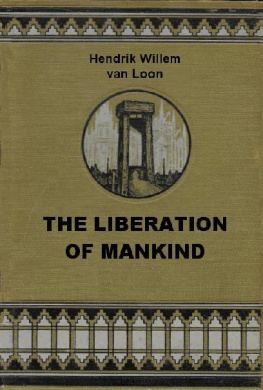Hendrik Spruyt - The Sovereign State and Its Competitors
Here you can read online Hendrik Spruyt - The Sovereign State and Its Competitors full text of the book (entire story) in english for free. Download pdf and epub, get meaning, cover and reviews about this ebook. year: 2020, publisher: Princeton University Press, genre: Politics. Description of the work, (preface) as well as reviews are available. Best literature library LitArk.com created for fans of good reading and offers a wide selection of genres:
Romance novel
Science fiction
Adventure
Detective
Science
History
Home and family
Prose
Art
Politics
Computer
Non-fiction
Religion
Business
Children
Humor
Choose a favorite category and find really read worthwhile books. Enjoy immersion in the world of imagination, feel the emotions of the characters or learn something new for yourself, make an fascinating discovery.
- Book:The Sovereign State and Its Competitors
- Author:
- Publisher:Princeton University Press
- Genre:
- Year:2020
- Rating:3 / 5
- Favourites:Add to favourites
- Your mark:
- 60
- 1
- 2
- 3
- 4
- 5
The Sovereign State and Its Competitors: summary, description and annotation
We offer to read an annotation, description, summary or preface (depends on what the author of the book "The Sovereign State and Its Competitors" wrote himself). If you haven't found the necessary information about the book — write in the comments, we will try to find it.
The Sovereign State and Its Competitors — read online for free the complete book (whole text) full work
Below is the text of the book, divided by pages. System saving the place of the last page read, allows you to conveniently read the book "The Sovereign State and Its Competitors" online for free, without having to search again every time where you left off. Put a bookmark, and you can go to the page where you finished reading at any time.
Font size:
Interval:
Bookmark:

The Sovereign State and Its Competitors
PRINCETON STUDIES IN INTERNATIONAL HISTORY AND POLITICS
Series Editors
Jack L. Snyder, Marc Trachtenberg, and Fareed Zakaria
Recent titles:
The Moral Purpose of the State: Culture, Social Identity, and Institutional Rationality in International Relations by Christian Reus-Smit
Entangling Relations: American Foreign Policy in Its Century by David A. Lake
A Constructed Peace: The Making of the European Settlement, 1945-1963 by Marc Trachtenberg
Regional Orders at Centurys Dawn: Global and Domestic Influences on Grand Strategy by Etel Solingen
From Wealth to Power: The Unusual Origins of Americas World Role by Fareed Zakaria
Changing Course: Ideas, Politics, and the Soviet Withdrawal from Afghanistan by Sarah E. Mendelson
Disarming Strangers: Nuclear Diplomacy with North Korea by Leon V. Sigal
Imagining War: French and British Military Doctrine between the Wars by Elizabeth Kier
Roosevelt and the Munich Crisis: A Study of Political Decision-Making by Barbara Rearden Farnham
Useful Adversaries: Grand Strategy, Domestic Mobilization, and Sino-American Conflict, 1947-1958 by Thomas J. Christensen
Satellites and Commisars: Strategy and Conflict in the Politics of the Soviet-Bloc Trade by Randall W. Stone
Does Conquest Pay? The Exploitation of Occupied Industrial Societies by Peter Liberman
Cultural Realism: Strategic Culture and Grand Strategy in Chinese History by Alastair Iain Johnston
The Korean War: An International History by William W. Stueck
Cooperation among Democracies: The European Influence on U.S. Foreign Policy by Thomas Risse-Kappen
The Sovereign State and Its Competitors by Hendrik Spruyt
Americas Mission: The United States and the Worldwide Struggle for Democracy in the Twentieth Century by Tony Smith
Who Adjusts? Domestic Sources of Foreign Economic Policy during the Interwar Years by Beth A. Simmons
Mercenaries, Pirates, and Sovereigns: State-Building and Extraterritorial Violence in Early Modern Europe by Janice E. Thompson
We All Lost the Cold War by Richard Ned Lebow and Janice Gross Stein
The Limits of Safety: Organizations, Accidents, and Nuclear Weapons by Scott D. Sagan
The Sovereign State and Its Competitors
AN ANALYSIS OF SYSTEMS CHANGE
HENDRIK SPRUYT
PRINCETON UNIVERSITY PRESS
PRINCETON, NEW JERSEY
Copyright 1994 by Princeton University Press
Published by Princeton University Press, 41 William Street, Princeton, New Jersey 08540
In the United Kingdom: Princeton University Press, Chichester, West Sussex
All Rights Reserved
Library of Congress Cataloging-in-Publication Data
Spruyt, Hendrik, 1956
The sovereign state and its competitors / Hendrik Spruyt.
p. cm. (Princeton studies in international history and politics)
Includes bibliographical references and index.
ISBN 0-691-03356-0
ISBN 0-691-02910-5 (pbk.)
eISBN 978-0-691-21305-7
Title. II. Series.
JC327.S65 1994 320.15dc20 94-10759 CIP
http://pup.princeton.edu
ISBN-13: 978-0-691-02910-8 (pbk.)
ISBN-10: 0-691-02910-5 (pbk.)
FOR LUCY LYONS
AND MY PARENTS,
DOLORES AND HENDRIK SR.
MAPS
TABLES
THE FIRST research for this project started roughly twenty-five years ago when I participated in the 750th anniversary of the founding of my hometown. I was puzzled by the fact that virtually every town and village in the region seemed to be celebrating the same thing, because they all seemed about equally old. I ascribed it to either chance or a desire among the townspeople to engage in continual festivities.
I did not know then that similar activities were taking place in much of Europe, particularly in the northwest. These events, commemorating the foundation and independence of cities, were in fact evidence of a great political and economic transformation that occurred some seven centuries ago. It was that transformation, due especially to a surge in trade, that allowed political entrepreneurs and social groups to create new institutions to displace the older feudal and ecclesiastical arrangements. Not all of these institutions are with us today. Indeed, only onethe sovereign, territorial statereally survives, although shadows of other forms of organization are ubiquitous and discernible to the observing traveler throughout Europe.
The idea that the anarchical nature of the international system imposes a rational choice problem on the actors in the system is essentially a description of a historically contingent situation. The international system has not historically been, and consequently in the future need not be, of its present nature. This book tries to explain how the current state system arose, why it has existed for so long, and how the process of its demise might come to pass.
This work is not a novel historical analysis. Although I use historical materials, those in search of a dramatic interpretation of heretofore unknown archives will be disappointed. Instead I attempt to draw attention to the oft-neglected case that only in hindsight looks anomalous and quaint. Thus, although I look at France, the Hanseatic League, and Italian city-states, this work is only in a secondary sense the history of any one of these. Instead, these serve as exemplars of the general question of why sovereign territoriality displaced non-sovereign and nonterritorial logics of organization, and how this affects international affairs.
I have incurred many debts. Peter Cowhey and Tracy Strong read more versions of the manuscript than they probably care to remember. They did so, however, with great care and intelligence and offered continual support. The same holds true for John Ruggie, whose inspirational work set me on the course of this project even before I knew him. I hope that I have taken advantage of these colleagues insights.
Special thanks also go to Stephen Krasner who read the entire manuscript with minute care and who provided trenchant critiques and suggestions which helped me state my argument with greater precision. John Hall likewise read and commented on the manuscript with insightful suggestions. Victor Magagnas comparative historical knowledge was indispensable to carrying out this project.
It has never been explained to me why spouses are usually mentioned in the last part of acknowledgments. Oblique references to spousal support under the rubric of last but not least simply do not do justice to the support of my wife. I thank Lucy Lyons for all her help.
I also particularly thank Deborah Avant with whom I shared many drafts, critiques, and ideas and a fair number of large cappuccinos. David Bartlett, Ellen Commisso, Eric Fredell, Scott Gates, Martha Howell, Walter Prevenier, Robert Ritchie, and Donald Wayne read all, or parts, of this work and provided many useful suggestions and comments. Dan Deudney, Miles Kahler, John Mundy, Phil Roeder, and Wim Smit provided help along the way both in substantive terms and in suggesting relevant literature. I also greatly benefited from the assistance of the faculty and staff of the Institute of War and Peace Studies at Columbia University.
Economic forces held not only the future of Europe in sway. At the University of California, San Diego, and at Columbia University, I benefited from the financial support of the Institute on Global Conflict and Cooperation, the Josephine de Karman Fund, and the Columbia Council for Research in the Social Sciences.
Font size:
Interval:
Bookmark:
Similar books «The Sovereign State and Its Competitors»
Look at similar books to The Sovereign State and Its Competitors. We have selected literature similar in name and meaning in the hope of providing readers with more options to find new, interesting, not yet read works.
Discussion, reviews of the book The Sovereign State and Its Competitors and just readers' own opinions. Leave your comments, write what you think about the work, its meaning or the main characters. Specify what exactly you liked and what you didn't like, and why you think so.











